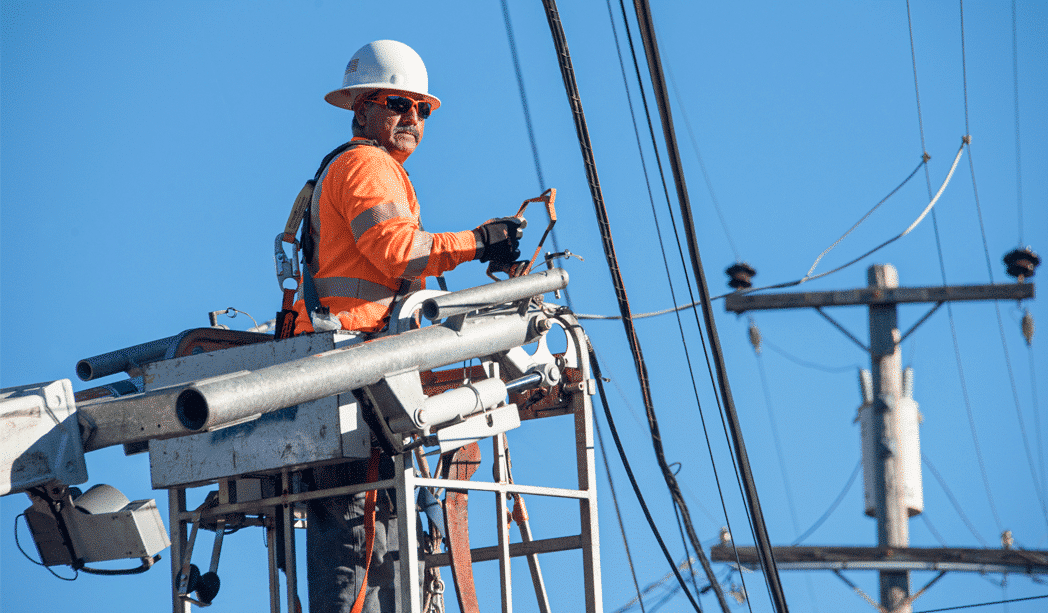
 Investors looking for a good way to play the ongoing infrastructure spend in the US should be thinking about Dycom Industries (Dycom Industries Stock Quote, Chart, News, Analysts, Financials NYSE:DY), says portfolio manager Gordon Reid —that is, if you can stomach the lumpy earnings.
Investors looking for a good way to play the ongoing infrastructure spend in the US should be thinking about Dycom Industries (Dycom Industries Stock Quote, Chart, News, Analysts, Financials NYSE:DY), says portfolio manager Gordon Reid —that is, if you can stomach the lumpy earnings.
“We own Dycom Industries in our small cap portfolio,” says Reid, president and CEO of Goodreid Investment Counsel, who spoke on BNN Bloomberg on Tuesday.
“The one caveat that I always mention is that their earnings are lumpy,” Reid said. “Part of the reason is that about 80 per cent of their total revenue comes from seven or eight major companies.”
A reflection of that sporadic business came in Dycom’s latest quarter, delivered in late May, where the company missed top and bottom estimates for its fiscal first quarter 2022. Dycom provides specialty contracting in the form of program management, engineering, construction, maintenance and installation for US telecom companies and electric and gas utilities, with tower construction, lines and antenna installation are some of the jobs Dycom does through its telco and wireless contracts.
Revenue from its largest customers saw a drop over the fiscal Q1, which helped cause a 10.7-per-cent year-over-year decline in overall revenue to $727.5 million. Earnings were also down, with adjusted EBITDA at $44.1 million compared to $69.9 million a year earlier and EPS at a loss of $0.04 per share compared to positive $0.36 per share a year ago. Analysts had been calling for $0.06 per share on a topline of $726.1 million. (All figures in US dollars.)
“We are encouraged with the emerging breadth in our business,” said president and CEO Steven E. Nielsen in the company’s first quarter conference call. “Our extensive market presence has allowed us to be at the forefront of evolving industry opportunities.”
“Telephone companies are deploying fibre to the home to enable 1 gigabit high speed connections, increasingly rural electric utilities are doing the same. Cable operators are deploying fibre to small and medium businesses and enterprises,” he said.
“Customers are consolidating supply chains, creating opportunities for market share growth and increasing the long-term value of our maintenance and operations business. As our nation and industry recover from the COVID-19 pandemic, we remain encouraged that a growing number of our customers are committed to multi-year capital spending initiatives,” Nielsen said.
Dycom’s fiscal Q1 saw one-per-cent organic growth on business with its largest customer, AT&T, which made up a full 21 per cent of the company’s quarterly revenue and delivered $155.6 million in sales. Contracts with Comcast, Dycom’s second-largest customer at 18 per cent of revenue, came in at $131.1 million with an 11-per-cent organic growth rate. Rounding out Dycom’s top five are Verizon with 12.6 per cent of revenue, Lumen at 11.8 per cent and Windstream at 4.4 per cent.
Dycom also saw strong organic growth from its fibre to electric utilities work, which came in at $47 million for the quarter and represented a 92.1-per-cent year-over-year growth rate.
“We have extended our geographic reach and expanded our program management network planning services,” said Nielsen. “In fact, over the last several years, we have meaningfully increased the long-term value of our maintenance and operations business, a trend which we believe will parallel our deployment of 1 gigabit wireline direct and wireless/wireline converged networks, as those deployments dramatically increase the amount of outside plant network that must be extended and maintained.”
Dycom’s share price has performed very well over the past year to dig itself not only out of the market-wide COVID pullback of early last year but to gain back some more ground lost since the stock was hitting all-time highs back in 2018. There, Dycom started heading south after, you guessed it, an earnings miss but also a retraction on revenue and earnings guidance from management.
Dycom dropped all the way from $120 per share in early 2018 to $45 by early 2020. But the stock rocked it over 2020, going from a COVID low of $13.49 on March 18 to $100 12 months later. The fiscal Q1 numbers have pulled Dycom lower in recent weeks.
But Reid says investors should see long-term growth from Dycom, despite the periodic ups and downs.
“Dycom is an infrastructure-type stock. They do the laying of fibre optic cable, so they’re a very big player in the 5G rewiring of North America so that we can have the technology infrastructure that will enable 5G to to work and to be in every part of our lives,” Reid said.
“But companies like AT&T, Verizon, Comcast and Google are big, big customers and if one of them delays a project for a quarter or pushes something out, all of a sudden Dycom misses. The reverse can happen. They can move it forward and Dycom hits,” he said.
“So, you see a lot of volatility within the stock. It’s a high-beta stock, but we think longer term for patient investors it’ll do well and you’ll benefit over the long term from the macro theme,” Reid said.
Leave a Reply
You must be logged in to post a comment.




 Share
Share Tweet
Tweet Share
Share




Comment